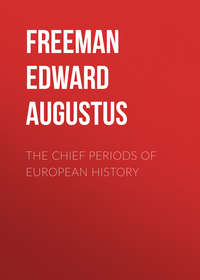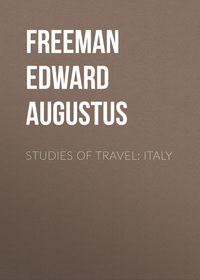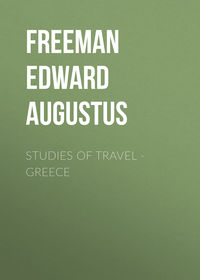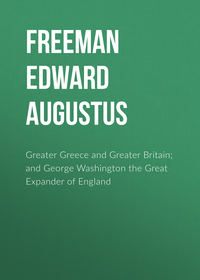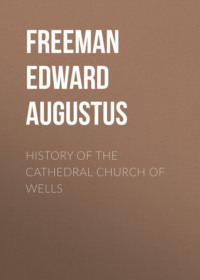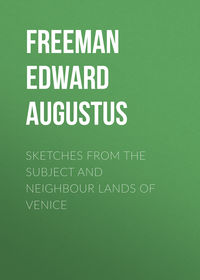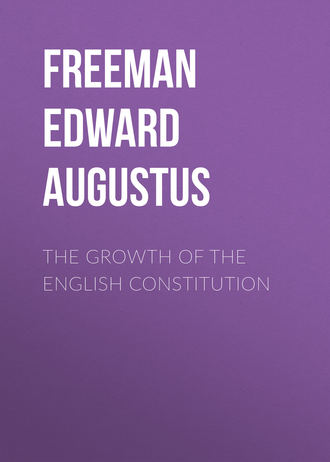 полная версия
полная версияThe Growth of the English Constitution
“Nullum tallagium vel auxilium per nos vel hæredes nostros de cetero in regno nostro imponatur seu levetur, sine voluntate et assensu communi archiepiscoporum, episcoporum et aliorum prælatorum, comitum, baronum, militum, burgensium, et aliorum liberorum hominum in regno nostro.” This, it will be seen, is the same provision which I have already quoted (see above, Note 36) from the Great Charter of John, but which was left out in the Charter in the form in which it was confirmed by Henry the Third. See Stubbs, 330, 332, 336.
110
I have said this before in Historical Essays, p. 41. On the strongly marked legal character of Edward’s age, and especially of Edward’s own mind, see Stubbs, 417.
111
The great statute of treason of 25 Edward the Third (see the Revised Edition of the Statutes, i. 185) secures the life of the King, his wife, and his eldest son, and the chastity of his wife, his eldest daughter, and his eldest son’s wife. But the personal privilege goes no further. As the Law of England knows no classes of men except peers and commoners, it follows that the younger children of the King – the eldest is born Duke of Cornwall – are, in strictness of speech, commoners, unless they are personally raised to the peerage. I am not aware that either case has ever arisen, but I conceive that there is nothing to hinder a King’s son, not being a peer, from voting at an election, or from being chosen to the House of Commons, and I conceive that, if he committed a crime, he would be tried by a jury. Mere precedence and titles have nothing to do with the matter, though probably a good deal of confusion arises from the very modern fashion – one might almost say the modern vulgarism – of calling all the children of the King or Queen “Princes” and “Princesses.” As late as the time of George the Second uncourtly Englishmen were still found who eschewed the foreign innovation, and who spoke of the Lady Caroline and the Lady Emily, as their fathers had done before them.
Another modern vulgarism is that of using the word “royal” – “royal visit,” “royal marriage,” and so forth – when there is no royalty in the case, the person spoken of being a subject, perhaps a commoner.
112
On the parliamentary position of the clergy see Hallam, Middle Ages, ii. 263. And as far as the reign of Edward the First is concerned, see the series of summonses in Stubbs, 442.
113
On this important constitutional change, which was made in 1664, without any Act of Parliament, but by a mere verbal agreement between Archbishop Sheldon and Lord Chancellor Clarendon, see Hallam, Constitutional History, ii. 405.
114
This is true on the whole, especially at the beginning of the institution of the States General, though there were also roturiers who were the immediate burgesses of the King. See Thierry, History of the Tiers Etat, i. 56 (Eng. trans.). It is in that work that the history of that branch of the States General should be studied.
115
The question of one or two Chambers in an ordinary monarchy or commonwealth is altogether different from the same question under a Federal system. In England or France the question between one or two Chambers in the Legislature is simply a question in which of the two ways the Legislature is likely to do its work best. But in a Federal constitution, like that of Switzerland or the United States, the two Chambers are absolutely necessary. The double sovereignty, that of the whole nation and that of the independent and equal States which have joined together to form it, can be rightly represented only by having two Chambers, one of them, the Nationalrath or House of Representatives, directly representing the nation as such, and the other, the Ständerath or Senate, representing the separate sovereignty of the Cantons. In the debates early in 1872 as to the revision of the Swiss Federal Constitution, a proposal made in the Nationalrath for the abolition of the Ständerath was thrown out by a large majority.
116
On the old Constitution of Sweden, see Laing’s Tour in Sweden.
117
This common mistake and its cause are fully explained by Hallam, Middle Ages, ii. 237.
118
“The two Houses had contended violently in 1675, concerning the appellate jurisdiction of the Lords; they had contended, with not less violence, in 1704, upon the jurisdiction of the Commons in matters of election; they had quarrelled rudely, in 1770, while insisting upon the exclusion of strangers. But upon general measures of public policy their differences had been rare and unimportant.” May’s Constitutional History, i. 307. The writer goes on to show why differences between the two Houses on important points have become more common in very recent times.
119
The share of the Witan in early times in the appointment of Bishops, Ealdormen, and other great officers, need hardly be dwelled upon. For a debate in a Witenagemót of Eadward the Confessor on a question of peace or war, see Norman Conquest, ii. 90. For the like under Henry the Third, see the account in Matthew Paris, in the year 1242 which will be found in Stubbs, 359. The state of the case under Edward the Third is discussed by Hallam, Middle Ages, ii. 184. See also May, ii. 86. But the most remarkable passage of all is one in the great poetical manifesto which I have several times quoted: it is there (Political Songs, 96) made one of the charges against Henry the Third that he wished to keep the appointment of the great officers of state in his own hands. The passage is long, but it is well worth quoting at length.
“Rex cum suis voluit ita liber esse;
Et sic esse debuit, fuitque necesse
Aut esse desineret rex, privatus jure
Regis, nisi faceret quidquid vellet; curæ
Non esse magnatibus regni quos præferret
Suis comitatibus, vel quibus conferret
Castrorum custodiam, vel quem exhibere
Populo justitiam vellet, et habere
Regni cancellarium thesaurariumque.
Suum ad arbitrium voluit quemcumque,
Et consiliarios de quacumque gente,
Et ministros varios se præcipiente,
Non intromittentibus se de factis regis
Angliæ baronibus, vim habente legis
Principis imperio, et quod imperaret
Suomet arbitrio singulos ligaret.”
120
Take for example the Act passed after Edward the Fourth’s success at Towton. Rot Parl. v. 466. Among other things, poor Henry the Sixth is not only branded as an usurper, but is charged with personally stirring up the movement in the North, which led to the battle of Wakefield and the death of Richard Duke of York. “The seid Henry Usurpour, late called Kyng Henry the Sixt, contynuyng in his olde rancour & malice, usyng the fraude & malicious disceit & dissimulacion ayenst trouth & conscience, that accorde not with the honoure of eny Cristen Prynce, … with all subtill ymaginacions & disceitfull weyes & meanes to hym possible, intended & covertely laboured, excited & procured the fynal destruction, murdre & deth of the seid Richard Duc, and of his Sonnes, that is to sey, of oure seid nowe Soverayne Lord Kyng Edward the fourth, then Erle of Marche, & of the noble Lord Edmund Erle of Ruthlande; & for th’ execution of his dampnable & malicious purpose, by writing & other messages, mowed, excited, & stured therunto the Duks of Excestr’ & Somerset, & other lordes beyng then in the North parties of this Reame.”
121
This statute was passed in 8 Henry VI. A.D. 1420. The complaint which it makes is well worth notice, and shows the reactionary tendencies of the time. The county elections had been made by “very great, outrageous, and excessive number of people dwelling within the same counties, of which most part was people of small substance, and of no value, whereof every of them pretended a voice equivalent, as to such elections to be made, with the most worthy knights and esquires dwelling within the same counties.” To hinder “the manslaughters, riots, batteries, and divisions,” which were likely to take place – it is not said that they had taken place – no one is to be allowed to vote who has not “free land or tenement to the value of forty shillings by the year at the least above all charges.” It is also provided that both the electors and the elected are to be actually resident in the county. The original French is worth quoting.
“Item come lez eleccions dez Chivalers des Countees esluz a venir as parlements du Roi en plusours Countees Dengleterre, ore tarde ount este faitz par tro[~p] graunde & excessive nombre dez gents demurrantz deinz mesmes les Countes, dount la greindre partie estoit par gentz sinon de petit avoir ou de null valu, dount chescun pretende davoir voice equivalent quant a tielx eleccions faire ove les plius valantz chivalers ou esquiers demurrantz deins mesmes les Countes; dount homicides riotes bateries & devisions entre les gentiles & autres gentz de mesmes les Countees verisemblablement sourdront & seront, si covenable remedie ne soit purveu en celle partie: Notre seigneur le Roy considerant les premisses ad pourveu & ordene par auctorite de cest parlement que les Chivalers des Countes deins le Roialme Dengleterre, a esliers a venir a les parlementz en apres atenirs, soient esluz en chescun Counte par gentz demurrantz & receantz en icelles dount chescun ait frank tenement a le valu de xl s. par an al meins outre les reprises; & que ceux qui seront ensy esluz soient demurrantz & receantz deins mesmes les Countes.” Revised Statutes, i. 306.
The necessity of residence in the case of either electors or representatives was repealed by 14 Geo. III. c. 58.
The statute goes on to give the Sheriff power to examine the electors on oath as to the amount of their property. It also gives the Judges of Assize a power foreshadowing that of our present Election Judges, that of inquiring into false returns made by the Sheriff.
Another statute of the same kind was passed later in the same reign, 23 Henry VI. A.D. 1444-5, from which it appears that the knights of the shire were ceasing to be in all cases knights in the strict sense, and that it was beginning to be found needful to fence them about with oligarchic restrictions.
“Issint que lez Chivalers dez Counteez pour le parlement en après a esliers so ent notablez Chivalers dez mesmez lez Counteez pour lez queux ils serront issint esluz, ou autrement tielx notablez Esquiers gentils homez del Nativite dez mesmez lez Counteez comme soient ablez destre Chivalers; et null home destre tiel Chivaler que estoise en la degree de vadlet et desouth.” Revised Statutes, i. 346.
Every enactment of this kind bears witness to the growth of the power of the Commons, and to the endeavours of the people to make their representation really popular.
122
Take for instance the account given by the chronicler Hall (p. 253) of the election of Edward the Fourth.
“After the lordes had considered and weyghed his title and declaracion, they determined by authoritie of the sayd counsaill, for as much as kyng Henry, contrary to his othe, honor and agreement, had violated and infringed, the order taken and enacted in the last Parliament, and also, because he was insufficient to rule the Realme, & inutile to the common wealth, & publique profite of the pore people, he was therefore by the aforesayed authoritie, depriued & deiected of all kyngly honor, & regall souereigntie. And incontinent, Edward erle of Marche, sonne and heyre to Richard duke of Yorke, was by the lordes in the sayd counsaill assembled, named, elected, & admitted, for kyng & gouernour of the realme; on which day, the people of the erles parte, beyng in their muster in sainct Ihons felde, & a great number of the substanciall citezens there assembled, to behold their order: sodaynly the lord Fawconbridge, which toke the musters, wisely declared to the multitude, the offences & breaches of the late agremente done & perpetrated by kyng Henry the vi. & demaunded of the people, whether they woulde haue the sayd kyng Henry to rule & reigne any lenger ouer them: To whome they with a whole voyce, aunswered, nay, nay. Then he asked them, if they would serue, loue, & obey the erle of March as their earthly prince & souereign lord. To which question they aunswered, yea, yea, crieng, king Edward, with many great showtes and clappyng of handes… The erle, … as kyng, rode to the church of sainct Paule, and there offered. And after Te deum song, with great solempnitie, he was conueyed to Westmynster, and there set in the hawle, with the scepter royall in his hand, where to all the people which there in a great number were assembled, his title and clayme to the croune of England, was declared by, ii. maner of ways: the firste, as sonne and heyre to duke Richard his father, right enheritor to the same; the second, by aucthoritie of Parliament and forfeiture committed by, kyng Henry. Wherupon it was agayne demaunded of the commons, if they would admitte, and take the sayd erle as their prince and souereigne lord, which al with one voice cried, yea, yea… On the morow he was proclaymed kyng by the name of kyng Edward the iiij. throughout the citie.”
This was in Lent 1461, before the battle of Towton. Edward was crowned June 29th in the same year. The same chronicler describes the election or acknowledgement of Richard the Third, p. 372.
123
One special sign of the advance of the power of Parliament in the fifteenth century was the practice of bringing in bills in the form of Statutes ready made. Hitherto the Acts of the Commons had taken the form of petitions, and it was sometimes found that, after the Parliament had broken up, the petitions had been fraudulently modified. They now brought in bills, which the King accepted or rejected as they stood. See Hallam, Middle Ages, ii. 222.
124
Macaulay, i. 38. “The knight of the shire was the connecting link between the baron and the shopkeeper. On the same benches on which sate the goldsmiths, drapers, and grocers who had been returned to Parliament by the commercial towns, sate also members who, in any other country, would have been called noblemen, hereditary lords of manors, entitled to hold courts and to bear coat armour, and able to trace back an honourable descent through many generations. Some of them were younger sons and brothers of great lords. Others could boast even of royal blood. At length the eldest son of an Earl of Bedford, called in courtesy by the second title of his father, offered himself as a candidate for a seat in the House of Commons, and his example was followed by others. Seated in that house, the heirs of the grandees of the realm naturally became as zealous for its privileges as any of the humble burgesses with whom they were mingled.”
Hallam remarks (ii. 250) that it is in the reign of Edward the Fourth that we first find borough members bearing the title of Esquire, and he goes on to refer to the Paston Letters as showing how important a seat in Parliament was then held, and as showing also the undue influences which were already brought to bear upon the electors. Since Hallam’s time, the authenticity of the Paston Letters has been called in question, but it has, I think, been fully established. Some of the entries are very curious indeed. In one (i. 96), without any date of the year, the Duchess of Norfolk writes to John Paston, Esquire, to use his influence at a county election on behalf of some creatures of the Duke’s: “It is thought right necessarie for divers causes þt my Lord have at this tyme in the p’lement suche p’sones as longe unto him and be of his menyall S’vaunts wherin we conceyve yor good will and diligence shal be right expedient.” The persons to be thus chosen for the convenience of the Duke are described as “our right wel-belovid Cossin and S’vaunts John Howard and Syr Roger Chambirlayn.” This is followed by a letter from the Earl of Oxford in 1455, much to the same effect. In ii. 98, we have a letter addressed to the Bailiff of Maldon, recommending the election of Sir John Paston on behalf of a certain great lady not named. The letter is worth giving in full.
“Ryght trusty frend I comand me to yow prey[~i]g yow to call to yor mynd that lyek as ye and I comonyd of it were necessary for my Lady and you all hyr Ser[~u]nts and te[~n]nts to have thys p’lement as for [~o]n of the Burgeys of the towne of Maldon syche a man of worchep and of wytt as wer towardys my seyd Lady and also syche on as is in favor of the Kyng and of the Lords of hys consayll nyghe abought hys p’sone. Sertyfy[~=i]g yow that my seid Lady for her parte and syche as be of hyr consayll be most agreeabyll that bothe ye and all syche as be hyr fermors and teñntys and wellwyllers shold geve your voyse to a worchepfull knyght and on’ of my Ladys consayll Sr John Paston whyche standys gretly in favore wt my Lord Chamberleyn and what my seyd Lord Chamberleyn may do wt the Kyng and wt all the Lordys of Inglond I trowe it be not unknowyn to you most of eny on man alyve. Wherefor by the meenys of the seyd Sr John Paston to my seyd Lord Chamberleyn bothe my Lady and ye of the towne kowd not have a meeter man to be for yow in the perlement to have yor needys sped at all seasons. Wherefor I prey yow labor all syche as be my Ladys ser[~=u]ntts tennts and wellwyllers to geve ther voyseys to the seyd Sr John Paston and that ye fayle not to sped my Ladys intent in thys mater as ye entend to do hyr as gret a plesur as if ye gave hyr an Cli [100l.] And God have yow in hys kep[~=i]g. Wretyn at Fysheley the xx day of Septebyr. – J. Arblaster.”
125
On the effects of the reign of Charles the Fifth in Spain and his overthrow of the liberties of Castile, see the general view in Robertson, iii. 434, though in his narrative (ii. 186) he glorifies the King’s clemency. See also the first chapter of the sixth book of Prescott’s Philip the Second, and on the suppression of the constitution of Aragon by Philip, Watson, Philip the Second, iii. 223.
The last meeting of the French States-General before the final meeting in 1789 was that in 1614, during the minority of Lewis the Thirteenth. See Sismondi, xiii. 342.
126
The legal character of William’s despotism I have tried to set forth almost throughout the whole of my fourth volume. See especially pp. 8, 617; but it is plain to everyone who has the slightest knowledge of Domesday. Nothing can show more utter ignorance of the real character of the man and his times than the idea of William being a mere “rude man of war,” as I have seen him called.
127
On the true aspect of the reign of Henry the Eighth I have said something in the Fortnightly Review, September 1871.
128
Both these forms of undue influence on the part of the Crown are set forth by Hallam, Constitutional History, i. 45, ii. 203. “It will not be pretended,” he says, “that the wretched villages, which corruption and perjury still hardly keep from famine [this was written before the Reform Bill, in 1827], were seats of commerce and industry in the sixteenth century. But the county of Cornwall was more immediately subject to a coercive influence, through the indefinite and oppressive jurisdiction of the stannary court. Similar motives, if we could discover the secrets of those governments, doubtless operated in most other cases.”
In the same page the historian, speaking of the different boroughs and counties which received the franchise in the sixteenth century, says, “It might be possible to trace the reason, why the county of Durham was passed over.” And he suggests, “The attachment of those northern parts to popery seems as likely as any other.” The reason for the omission of Durham was doubtless that the Bishoprick had not wholly lost the character of a separate principality. It was under Charles the Second that Durham city and county, as well as Newark, first sent members to Parliament. Durham was enfranchised by Act of Parliament, as Chester city and county – hitherto kept distinct as being a Palatinate – were by 34 & 35 Hen. VIII. c. 13. (Revised Statutes, i. 522.) Newark was enfranchised by a Royal Charter, the last case of that kind of exercise of the prerogative. Hallam, ii. 204.
129
I do not know what was the exact state of Old Sarum in 1265 or in 1295, but earlier in the thirteenth century it was still the chief dwelling-place both of the Earl and of the Bishop. But in the reign of Edward the Third it had so greatly decayed that the stones of the Cathedral were used for the completion of the new one which had arisen in the plain.
130
On the relations between Queen Elizabeth and her Parliaments, and especially for the bold bearing of the two Wentworths, Peter and Paul, see the fifth chapter of Hallam’s Constitutional History, largely grounded on the Journals of Sir Simonds D’Ewes. The frontispiece to D’Ewes’ book (London, 1682) gives a lively picture of a Parliament of those days.
131
On the relations between the Crown and the House of Commons under James the First, see the sixth chapter of Hallam’s Constitutional History, and the fifth chapter of Gardner’s History of England from 1603 to 1616.
132
This was the famous motion made by Sir Robert Peel against the Ministry of Lord Melbourne, and carried by a majority of one, June 4, 1841. See May’s Constitutional History, i. 158. Irving’s Annals of our Times, 86.
133
This of course leaves to the Ministry the power of appealing to the country by a dissolution of Parliament; but, if the new Parliament also declares against them, it is plain that they have nothing to do but to resign office. In the case of 1841 Lord Melbourne dissolved Parliament, and, on the meeting of the new Parliament, an amendment to the address was carried by a majority of ninety-one, August 28, 1841. The Ministry therefore resigned.
134
This is well set forth by Sir John Fortescue, De Laudibus Legum Angliæ, cap. 36: “Neque Rex ibidem, per se aut ministros suos, tallegia, subsidia, aut quævis onera alia, imponit legiis suis, aut leges eorum mutat, vel novas condit, sine concessione vel assensu totius regni sui in parliamento suo expresso.”
135
How very recent the establishment of these principles is will be seen by anyone who studies the history of the reign of George the Third in the work of Sir T. E. May. Mr. Pitt, as is well known, kept office in defiance of repeated votes of the House of Commons, and at last, by a dissolution at a well-chosen moment, showed that the country was on his side. Such conduct would not be deemed constitutional now, but the wide difference between the constitution of the House of Commons then and now should be borne in mind.
136
Though the command of the Sovereign would be no excuse for any illegal act, and though the advisers of any illegal act are themselves responsible for it, yet there would seem to be no way provided for punishing an illegal act done by the Sovereign in his own person. The Sovereign may therefore be said to be personally irresponsible.
137
See Macaulay, iv. 435. It should not be forgotten that writers like Blackstone and De Lolme say nothing about the Cabinet. Serjeant Stephen supplies the omission, ii. 447.
138
The lowly outward position of the really ruling assembly comes out in some degree at the opening of every session of Parliament. But it is far more marked in the grotesque, and probably antiquated, ceremonies of a Conference of the two Houses. This comes out most curiously of all in the Conference between the two Houses of the Convention in 1688. See Macaulay, ii. 660.
139
See Note 56, Chapter ii.
140
See Macaulay, iv. 437.
141
“Ministers” or “Ministry” were the words always used at the time of the Reform Bill in 1831-1832. It would be curious to trace at what time the present mode of speech came into vogue, either in parliamentary debates or in common speech.


